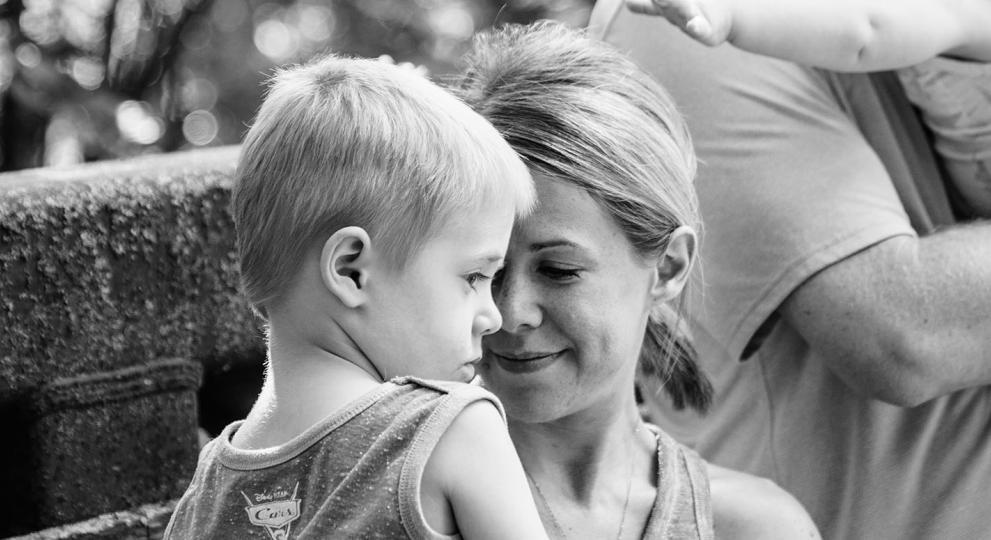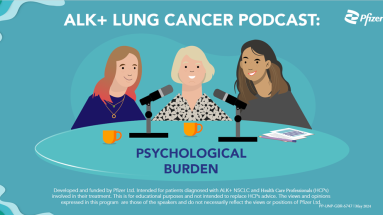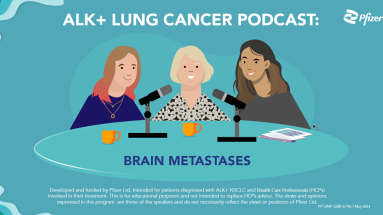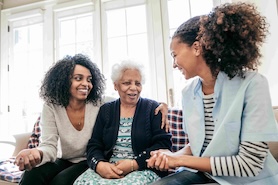Sharing your diagnosis
A cancer diagnosis may feel overwhelming, which is why it's helpful to have a strong support system in place, but before you can turn to friends and family, you first have to share the news with them. A cancer diagnosis is incredibly personal, so there's no one-size-fits-all way to communicate with the people in your life. It's up to you to decide who to tell and how many details to offer.
Below, we've compiled some tips on how to talk about your diagnosis with the people who may need to know.
Close friends and family
Whether it's your spouse, parents, siblings or dearest friends, it's important to share your diagnosis with someone close to you. These people can be your emotional and logistical support system as you confront your diagnosis. Sharing the news may be intimidating, but there are a few things you can do to reduce the stress. First, select a quiet place to talk about your diagnosis. If you're sharing with someone over the phone, let them know you have something important to talk about and make sure you have their undivided attention. Second, decide in advance what information you want to share. You may want to discuss the details of your diagnosis, answer any questions and let them know how you want to communicate moving forward (for example, is it okay for them to ask for updates or do you prefer to share in your own time?). This is also an opportunity to talk about the type of help you might need, such as getting a lift to appointments, a companion for doctor's visits or help making meals – information you can also share on an ongoing basis through the ByYourSide™ app. It’s more than likely that your closest contacts will be eager to talk to you and offer any support they can.
Colleagues
Depending on your level of closeness with your work colleagues, you may or may not choose to share. If your treatment will impact your work, it may be necessary to tell a few select people, but it's up to you to decide the level of detail. Communicating with your supervisor and/or a human resources representative should be the first step to ensure they hear the news directly from you. Make an official appointment so you can have an uninterrupted, private conversation about the impact your diagnosis might have on your ability to work and if you might need to take a leave of absence. Remember, anything you discuss with your manager or HR rep should remain confidential. If you decide to share with additional colleagues, first determine how and when you'll communicate this news. It could be done one-on-one with colleagues who need to know, formally in a team meeting or with a brief email. Colleagues may have questions and, again, it's up to you to decide how much detail you want to share. You may simply decline to share more when someone asks or ask a trusted colleague to field questions and share any approved updates.
Acquaintances
There may be some people who are not particularly close friends but might benefit from knowing about your diagnosis to avoid awkward situations. If there are people in your social circle that you know you'll run into (fellow Parents Association members or friends of friends you see at dinner parties, for example), you may choose to have a mutual friend let them know or come up with a sentence or two, should it crop up. For example, "I know it's been a while since I've seen you. I've recently been diagnosed with cancer. I'm grateful to be surrounded by close friends and family." Or you may choose to keep your diagnosis to yourself and ask that mutual friends also not share the news, and that's perfectly okay as well.
Children
If you have children, sharing the news with them is likely a delicate and potentially stressful conversation you'll need to have. While you don't want to unnecessarily frighten your children, depending on their age and developmental stage, it is important to let them know what's going on. If you have young children, share the news in simplistic terms that they can understand, letting them know you're sick and the doctors are doing everything they can to help you get better. If you have older children, you may choose to share specific details if you feel they can process it. No matter their age, know that this news will likely feel scary. Let them know they are loved and that you are there to answer any questions they have. For young children, you may also want to reassure them that they won't get poorly and that they didn't do anything wrong. There are many reputable online resources that offer in-depth information on how to share a cancer diagnosis with children. You may want to do some research on your own or pick up a children's book that will help you position your diagnosis in a child-friendly way. As with close friends and family, sharing with your children will be an ongoing conversation as you help them to understand your health and reassure them.
Whenever and however you choose to share your health news, you may feel more comfortable doing so if you practice what you're going to say first. A trusted friend or family member, therapist or support group may help you get comfortable with communicating your diagnosis. You'll most likely find that as you share your news, many people may want to reach out and help however they can.










